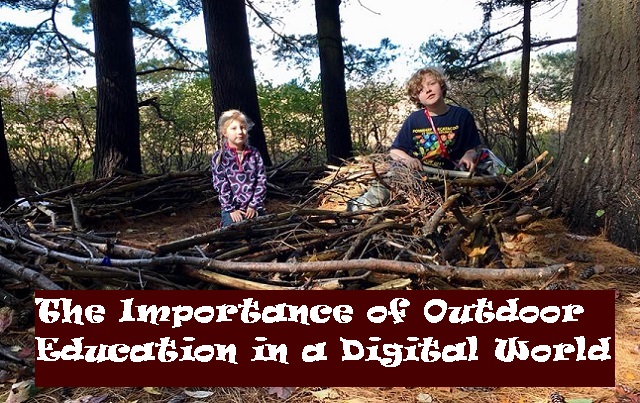The Importance of Outdoor Education in a Digital World


I grew up in a large city. Swapping childhood stories with my husband, he was appalled when I explained that recess at the schools I attended meant being released to an enclosed, asphalt yard. I counted myself lucky that I actually had a backyard at home with trees and flowers. Most of my friends only had a small square of grass in front of their house. Needless to say, our exposure to nature was a bit limited.
Luckily, the private school that I went to recognized this need. We had an environmental education program in grades 4 through 6, where we got to stay at a campground for a few days in the fall and the spring. I recently asked some old schoolmates about it, and found that they have as many treasured memories of the experience as I do.
Unlike me, my children are growing up in a more rural area. They have much more experience with nature than I did. Even so, when we went camping for our family vacation this year, and completely disconnected from electronics (no TV, cell phones, or other devices), my children were even more engaged with the world around them than normal. Some of the things that we did were:
• Identified leaves and plants that we found
• Learned about wildlife that was native to the area
• Learned the differences between venomous and non-venomous snakes
• Learned how to identify raptors in flight
• Collected leaves, ferns, etc. and made charcoal rubbings and sketches in nature journals
• Observed and felt moss growing
• Found a bird’s nest
• Saw the natural growth and decay of the forest
• Learned how to build a fire and cook over it
• Practiced carving wood
• Collected pine resin and learned some uses for it
My son actually remarked that he thought life was better without TV! Being outside without the distractions of modern society allows for more intimacy with nature and with each other. We interact more fully with each other. It inspires awe. It demands use of all of the senses and strengthens observation skills. Navigating on uneven terrain helps to develop core strength and a sense of balance. Self-directed learning occurs naturally in the outdoors, as children ask questions about the world around them.
In my son’s case, I’ve watched his confidence grow as he is now able to answer some of his younger sister’s questions. Sometimes, he can even answer mine, when he shares a tidbit that he has learned from his father.
Of course, we can’t camp all the time, but now that it is spring, we often finish up our school day with a walk. I ask them to point out any signs of spring that they notice and it is fun to witness the progression from day to day. The exercise, fresh air, and connection with nature is calming and has pretty much the opposite effect on them that screen time does. Screens have their place in our lives, but they cannot replace time spent outdoors, which meets a need that seems to be instilled in us from our Creator, to recognize our part in His creation.
“But now ask the beasts, and they will teach you;
And the birds of the air, and they will tell you;
Or speak to the earth, and it will teach you;
And the fish of the sea will explain to you.
Who among all these does not know
That the hand of the Lord has done this,
In whose hand is the life of every living thing,
And the breath of all mankind?” – Job 12:7-10
Heather Eberlin is a married mother of four children, ranging in age from six to twenty-five. She is currently homeschooling her two youngest children and has felt called to share her journey in order to encourage others. She in an amateur gardener who is amazed at the things that God’s creation reveals when you take the time to pay attention to it. You can follow her at Musings from My Garden.










































